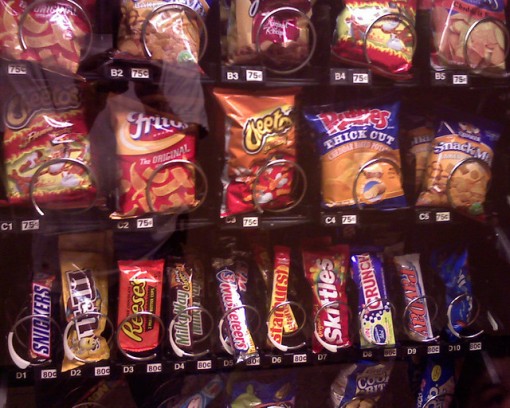John Shortino
As he smashed the fire extinguisher through the Vend-O-Matic’s Plexiglass window, Matthew thought of a first sentence: “On Monday morning, Hank Peterson’s boss called him into his office to discuss his performance.”
The plexiglass loosened enough to let him slip his hand in and disable the lock, allowing him access to the snacks within. A feast, compared to what was left at the grocery stores. Maybe a little stale, but did a Snickers bar ever truly expire? He shoveled handfuls of trail mix, peanut butter crackers, and chips into his duffel bag, pausing only long enough to notice a bag of Doritos that had failed to fall into the bin below. He imagined someone’s frustration, then their embarrassment at one of the last things they felt being anger at a broken machine.
Hank Peterson probably worked in a big office downtown, not like this little two-floor box in a mini-mall at the edge of the suburbs. Matthew tended to avoid those kinds of buildings now, nature having quickly taken over in the wake of the Calamity. Root systems invaded sub-basements, flooding rotted out foundations; a big building was liable to collapse beneath your feet on its way to reclamation. These small buildings would suffer the same fate, but at least it was a shorter trip out the front door.
The vending machine cleared of everything but chewing gum, Matthew moved on to the supply closet. There, he pocketed a few pens before locating his actual target: an unopened case of copy paper. He tore into one of the reams and used one of the new pens to jot down the first sentence before he forgot it.
Hank Peterson had problems. He had spent the last few nights in a hotel after his wife threw him out. She had discovered some emails he’d exchanged with a woman he met at a conference. What kind of conference? Sales, maybe. Pharmaceuticals. Wasn’t that industry once populated by beautiful pill-pushers?
That reminded Matthew; he glanced around the closet and found another prize, a case of Advil two-packs, mostly full. Stores had been looted early on, but for some reason no one had thought to search the places where people spent most of their waking hours. Matthew had done pretty well for himself at these tiny offices, stocking up on nonperishables and supplies, camping in break rooms if they happened to have a couch.
He decided he liked the name “Hank Peterson.” Names had gone the way of everything else the afternoon of the Calamity, or in its aftermath. He had met a man early on who called himself “Three,” because he had only seen two others in the weeks since. Matthew had not offered to change his name to “Four.” Hank Peterson, though. That was a real name. Hank was probably middle management. Hank had proven himself in the field, closing deals he had no business closing. Hank Peterson had achieved so much, though, that he was beginning to wonder what was next. Did it matter that he was the regional sales leader, if his sixteen-year-old daughter didn’t talk to him anymore?
Through the plate glass window on the second floor, Matthew watched the sky begin to darken. Within an hour, the gangs of survivors, the looters and sadists, would emerge from wherever they hid from the daylight. Too late to move on; this place would have to do for the night. Matthew tossed the entire box of Advil into his backpack. Downstairs, he triggered the locks at the top and bottom of the front door. They wouldn’t keep out someone very determined, but would at least slow them down.
Hank Peterson’s boss told him he’d been slipping lately. The Sanofi deal had fallen apart, and that was supposed to be a sure thing. Matthew tried to remember where he had pulled the word “Sanofi” from. A pill bottle in someone’s desk drawer, maybe.
Hank Peterson’s boss asked him,“What do the next five years here look like to you?”
Night seemed to come quickly since the Calamity, and the darkness was not like it used to be. No more light pollution, no more haze. Matthew retreated from the glass door as two figures appeared in the streets. A meeting room on the second floor had a love seat and a single, defensible door. There, he switched on his flashlight, found weeks ago beneath a display in a sporting-goods store.
Hank Peterson felt dizzy and realized his boss was waiting for an answer. The windows behind the boss’s desk gave an unimpeded view of the city, but Hank had never felt so claustrophobic. When he tried to answer, his tongue felt numb, and he had the stupid thought of what his clients might prescribe him at this moment, but there was no medicine that would cure uncertainty or ease the unknowability of the future.
Matthew heard shouting outside, then a motorcycle engine. Under his flashlight’s narrow beam, he put the pen to paper.
John Shortino’s work has appeared in various magazines, including Barrelhouse, The Collagist, and The Sonora Review. He lives in Pittsburgh, where he is working on a novel. Follow him on Twitter at @shortino.

